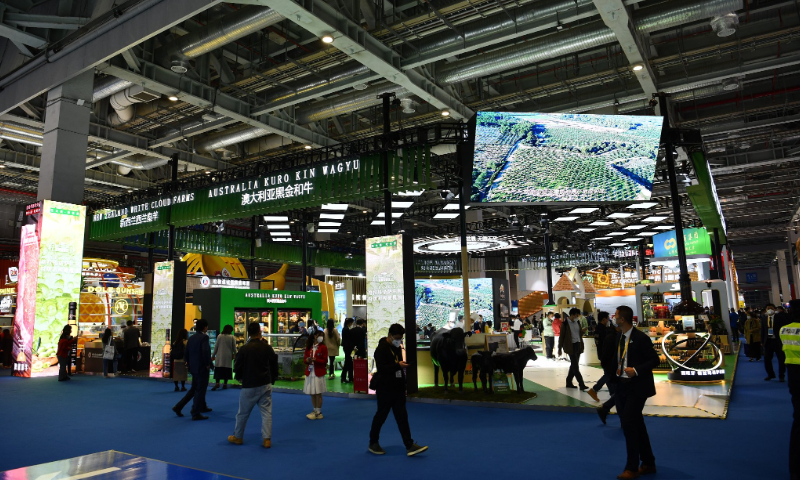
The booth of Australia Kuro Kin Wagyu at the fifth China International Import Expo on November 5, 2022. Photo: VCG
China-Australia trade declined in 2022, according to data released on Friday by the General Administration of Customs (GAC), amid sour bilateral relations with the previous Australian government.
In 2022, China-Australia trade reached $220.91 billion, down 3.9 percent year-on-year, the GAC data showed. Australian exports to China reached $142.09 billion, a drop of 13.1 percent year-on-year.
China is a prime market for many Australian goods including coal, iron ore and wine. However, many of these goods lost ground in the Chinese market as domestic companies sought alternatives to reduce the risk from disruption amid cooled relations.
For example, Chinese traders turned toward French wine after anti-dumping tariffs were levied on Australian wine.
Chinese coal companies have also ramped up imports from Indonesia, Mongolia and Russia to diversify their sources of supplies.
However, the situation may change in 2023 as domestic companies are restoring their attention and enthusiasm for Australia amid the improved outlook for bilateral ties under the new Australian government.
Chinese steel companies have started resuming coal imports from Australia, to diversify their sources of supplies and stabilize import prices, the Global Times learned from an industry insider.
Chinese Ambassador to Australia Xiao Qian presented an upbeat tone over China-Australia ties in a New Year press conference early this week. "The relationship between China and Australia is at a critical stage of turnaround," Xiao said, suggesting that the two sides could seek to resolve trade differences through direct negotiations.
"I personally believe that when we have a consistent improvement in the relationship, that will give people more confidence that they can continue their business relationship," he said.
Improving the relationship between the two countries has been a top-down process since the Bali summit of the two countries' leaders in November, and the momentum is strong, Chen Hong, president of the Chinese Association of Australian Studies and director of the Australian Studies Centre at East China Normal University, told the Global Times in a previous interview.
He predicted that the two sides will find more potential for cooperation, including in some new areas such as the green economy and clean energy, where China and Australia have strong complementarity.
Traditional cooperation in coal and other energy sources, aquaculture, fisheries and other blue economy fields, tourism and international education are also expected to see a recovery, Chen predicted.
Global Times

